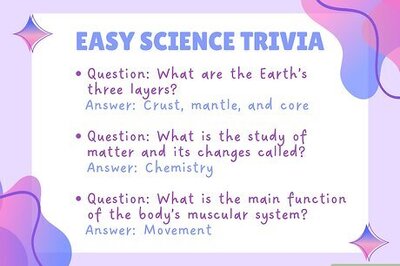
views
- A dry personality is one that’s stiff, guarded, or doesn’t show much emotion. Other people may find a dry personality unapproachable or uninteresting.
- You might have a dry personality if you repress your emotions, have few hobbies or interests, or find it difficult to converse with other people.
- Other signs of a dry personality include a tendency to follow rules, living a routine life without much variety, or being overly meticulous in your work.
What is a dry personality?

A dry personality is one that doesn’t show much emotion. If someone says you have a “dry personality,” they might mean that you’re a bit stiff, subdued, or guarded. Dry personalities are often introverted, meaning they avoid or struggle with social interaction. They also tend to have a type-A personality, meaning they’re tightly wound, serious, or clinical in their emotions. Overall, other people may find dry personalities hard to connect with. It’s said there are 5 primary personality traits: openness, conscientiousness (organization), extroversion, agreeableness, and neuroticism (anxiousness). Dry personalities tend to be closed off to new experiences, highly organized, introverted, less agreeable, and fairly anxious.
Signs of a Dry Personality

You tend not to show your emotions. Some people emote like cartoon characters, while others tend to feel those emotions internally. A dry personality is the latter. You prefer to process your experiences and emotions—both positive and negative—inside, rather than letting them show on your face or in your body language, even around people you’re close to. Some people might say you’re “robotic” or “overly serious,” but that’s mostly just because they don’t understand the way you interact with your emotions, which may not be how they’re used to.

You’re extremely meticulous. Dry personalities tend to be what’s known as “conscientious.” This is when you prioritize organization, planning, and details. It’s a definite strength of a dry personality, and helps you succeed at work, or in situations when organization is key. When you have the reins, everything is in order, where it needs to be, and is done on time. Unfortunately, this may make other people see you as uptight. Your passion for order may be read as a need for control, especially when other people don’t share that passion.

Your sense of humor is subdued. People with dry personalities tend to have less universal senses of humor. You might have “dry humor,” which is when you say something subtly funny with a serious demeanor. Or, as someone with high conscientiousness, you might even have aggressive or self-deprecating humor, which is humor at your own or others’ expense, which tends to be more controversial. Often, we think of “healthy” humor as “affiliative,” or humor that sympathizes with others, or “self-enhancing,” or humor that reaffirms or bolsters your own personality.

Others think you’re a bit judgemental. Everyone judges, that’s just human nature. But people with “dry” personalities tend to appear more judgemental than others. This is largely because other people find them hard to read, and so assume that the “dry” person may be hiding negative opinions. It’s unfortunate and unjust, but in some respects, society tends to be more comfortable with people who plainly show their emotions. That said, you may actually be judgemental, but mostly toward yourself. “Dry” personalities tend to spend a lot of time self-analyzing and self-critiquing, even to their own detriment.

You tend to take the sidelines in social situations. Social situations favor the big and the bold. So for someone who’s less audacious, or dry, social functions might be a bit more of a struggle. You might stay on the fringes of the party, or wait for someone else to strike up a conversation rather than approach another person. That said, other people may be hesitant to talk to you, thinking you might not want to or be able to chat, given your cool exterior.

You struggle to find things to talk about. This quality falls under the “openness” personality trait. Someone who’s dry tends to be less open about their emotions, hobbies, and personal life, which can make conversation difficult. You might have no problem with small talk, but as soon as the conversation turns to more personal or profound topics, you prefer to listen rather than speak. It could even be that you lack hobbies to talk about, or haven’t examined your emotions in ways that enable you to verbalize them.

You play by the rules. Dry personalities who are also type-A or highly conscientious also tend to stick to the rules or defer to higher authorities. You believe that following guidelines and obeying leaders is the best way to work toward success, and that breaking rules or experimenting may be counterproductive. You might butt heads with people who are less conscientious or more outgoing, who prefer to forge their own paths or to stray from authority.

You’re extremely independent. People with big personalities tend to be great at interfacing with other people, and be open to new experiences, which makes them highly social and team players. The opposite may be true of a dry personality: Your reservedness, introversion, and meticulousness makes you incredibly independent. You can get by without much help from other people, and you may even prefer it that way. Some may mistake your independence for pretentiousness or judgment, even if it’s simply a side effect of your latent personality.

You have few or traditional beliefs. How you develop your personality depends on your family environment, school life, media, and a number of other things. In some cases, people with dry personalities didn’t have many of these, or had low-quality opportunities for development, which caused a lack of opportunities to make up their own minds about the world around them, leading to very few personal convictions, resulting in a dry or not very complex personality. In place of those opportunities, some people take on traditional or customary beliefs of their religion or culture in order to fill out their personalities.

You live a very routine life. Humans are creatures of habit and routine. But sometimes those routines make for an insular life, which in turn limits new experiences. When you only ever stick to what’s familiar, you begin to lack variety and valuable opportunities for growth, which help to make a person more interesting and less dry. Of course, not all routines are harmful. For example, brushing your teeth every night before bed is a positive routine. But watching television every night when you might be doing something more creative may be a limiting routine.

You’re often bored. Boredom often occurs when you have a high level of brain function, but no stimulus to direct that function toward. As someone with a dry personality, you’re probably very intelligent and thoughtful, but your daily routine or lack of stimulating hobbies means that you find yourself bored more often than not. That said, boredom can be a positive thing from time to time. Periods of boredom are often when we process emotions, events, or other thoughts that we may not have had time for while doing other things.

You have a one-track mind. A dry, conscientious person tends to make a plan and stick with it. They become focused on their goal, and often ignore other things in order to achieve that goal. This sometimes means your life is taken over by that singular aim, which in turn may make it hard to talk to other people about your various passions and desires. In social settings, you may only want to talk about your current goal, which can make you inflexible in conversation, when other people might want to talk about other things.

You don’t often feel excited. People around you tend to perk up at small things, or cause a fuss (positive or negative) over things you don’t find significant. You can acknowledge that things are exciting, but it either doesn’t show on your face, or you don’t actually feel it deep inside. Notably, this is also a symptom of depression. Depression is sometimes (but not always) a cause of a dry personality. Your lack of excitement might also make it hard to bond with others, since moments of excitement tend to bring people closer together.
Causes of a Dry Personality

Depression Depression has cascading effects on your personality. If you’re depressed, you’re less likely to feel hopeful or passionate, have difficulty concentrating, and may generally be disinterested in the world around you. All these things add up to what some call a “dry personality,” even if such a label isn’t fair or indicative of your current struggles. Overcome depression by exercising regularly, talking with loved ones, and balancing your diet. If your depression is chronic or severe, consider speaking with a therapist about your struggle to better understand it.

Past trauma Trauma and PTSD are known to inhibit mental development and induce things like anxiety, irritability, memory issues, or difficulty thinking or learning. All these symptoms impair the development of your personality, and other people may see you as “dry” or detached as a result, often unaware of your past experiences who made you the person you are. Talk to a therapist about past traumas like abuse, injuries, or psychological struggles if you believe they’re getting in the way of connecting to the people around you.

Low self-esteem Low self-esteem, or negative feelings toward yourself, fosters general negativity and often makes us close ourselves off to others. As a result, we may appear to other people as subdued, introverted, inaccessible, and, yes, “dry.” Conversely, people with higher self esteem tend to be more agreeable and accessible to the people around them. Improve your self-esteem by redirecting negative thoughts with positive self-talk. For example, if you catch yourself thinking, “I can’t do this,” interrupt it with the thought, “I’m capable and confident, and I can achieve this if I set my mind to it.”

Anxiety Chronic anxiety tends to make us overly worried or aware of dangers, which in turn prevents us from trying new things or opening up to the people around us. Openness and agreeableness are 2 primary traits of an outgoing person, or someone who isn’t “dry,” which is why people with dry personalities sometimes suffer from acute anxiety. Interrupt and overcome anxiety by pausing when you feel worried or paralyzed. Breathe in for 10 seconds, then out for 10 seconds. Often, calming your body is the first step to calming your mind.

Underdeveloped personality Your personality is something you’re constantly building through your experiences and daily choices. If you have a “dry” personality, it could just be that you’re still figuring out what makes you, you! As you learn, grow, and encounter the world around you, you’ll likely develop new beliefs, experiences, and stories that will come together to make your personality not so dry.
Developing Your Personality

Pick up a new hobby to make yourself more interesting. Hobbies are excellent opportunities to meet new people, have new experiences, and develop your personality along the way. Think of something you’ve always wanted to do, then go out and do it! Join a club dedicated to that hobby, or find an online space like a forum, YouTube channel, or blog to help you learn and connect to other people who enjoy that hobby. When finding a new hobby, commit to trying it at least 3 times to give it an opportunity to stick. People tend to quit new experiences before they reach that crucial moment where it “clicks.”

Develop your sense of humor. Your sense of humor can play a big role in how you connect to other people. Humor that mocks or belittles yourself or others (often associated with dry personalities) can be alienating, but humor that is relatable or builds yourself up is often more agreeable and attractive. Develop your sense of humor by taking note of what other people find funny, and ask yourself why it works. Was it a story of a bizarre experience? Did it make another person feel good about themselves? Try to emulate it in your own humor.

Emote with body language. People with dry personalities tend to emote less than other people. But body language—how you move your body to express your emotions—is a key factor in reading and understanding emotions, which can help you be more approachable and agreeable. Practice reading body language like eye contact or hand gestures, then use that language in your own interactions. Observe how other people act and move when they’re happy, sad, agitated or anything else. Aim to emulate those behaviors to help other people read your own emotions.

Show interest in the people around you. One big hurdle of having a dry personality is struggling during conversations. The cure? Asking lots of questions! People generally love to talk about themselves, and when you ask them quality questions, the conversation naturally gets deeper and more personal. It also helps you get more comfortable with answering questions, as you get more familiar with the person you’re talking to. To ask better questions, avoid simple yes-or-no questions. Open-ended questions tend to get more interesting answers. For example, instead of, “Do you like sushi?” you might ask, “What’s your favorite kind of food, and why?”

Practice relaxation and mindfulness with breathing exercises. Relaxation is integral to a more stress-free life. And learning to manage your stress generally makes you a more approachable and agreeable person, and helps others to see you as less uptight or anxious. Each day, take a moment to relax by taking deep, 10-second breaths for a full 5 minutes, which may help clear your mind. Also, relax by taking a walk, hike, or generally getting into nature. Not only is nature good for relaxation, it gives you something interesting to talk about!




















Comments
0 comment